If you’ve tried to open a US bank account but don’t have a Social Security Number (SSN), you might have encountered a roadblock or two. However, several reputable banks allow you to open a bank account online without an SSN.
Read on to learn about the process of opening a bank account without an SSN and to compare bank options.
What is an SSN?
An SSN, or Social Security Number, is a unique nine-digit identification number issued by the Social Security Administration (SSA) in the United States.
It’s primarily used to track an individual’s lifetime earnings and monitor their Social Security benefits. Employers also typically require an SSN for tax and employment verification purposes.
Similarly, financial institutions use SSNs to verify your identity when you open a bank account or apply for a loan. However, some banks allow you to open an account without providing a Social Security Number.
SSNs can be obtained by filling out a special form called the SS-5 form. This form must be filled in and submitted to the SSA, along with evidential documents to get an SSN card, replace a lost one, or make corrections to an existing card.
skip down to find Banks that Do Not Require an SSN
Can You Open a Bank Account Without an SSN?
It’s possible to open a bank account without a Social Security Number (SSN) as long as you choose the right bank and understand its requirements.
While many banks require an SSN for identification purposes, some financial institutions offer alternatives for individuals who don’t have one.
These alternatives may include using an Individual Taxpayer Identification Number (ITIN) or a passport. Each bank has its own policies and requirements, so it’s important to research and choose a bank that accommodates individuals without an SSN.
How To Open A Bank Account Without An SSN
Opening a bank account online without a Social Security Number isn’t complicated, but taking the time to do your homework can help you save a lot of money down the line.
While each bank’s requirements can differ, here are the general steps required to open a bank account without an SSN:
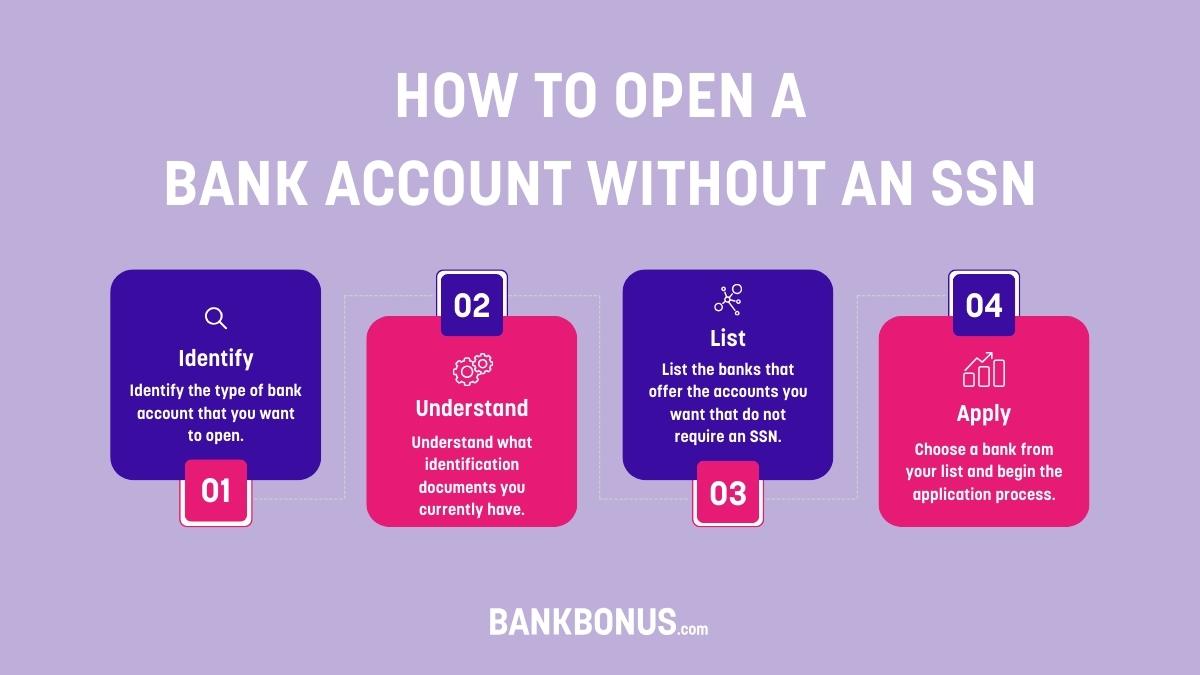
Step 1: Identify the Type of Bank Account You Want
There are several different bank accounts available. Most people open a personal checking account and a savings account.
A checking account can help you get paid and make payments, while a savings account is there to help you set money aside for a rainy day.
If you own a small business or LLC, you may also want to open a business bank account.
Online savings accounts, certificates of deposit (CDs), and some checking accounts offer competitive interest rates, so you can earn interest on the money in your account.
Step 2: Understand What Identification Documents You Have
While not all banks require SSNs, they will ask for some forms of identification. Make a list of all of the documents and identification cards you have and ensure they’re up-to-date and readily available.
Doing this will help you narrow down the list of banks you could use.
Step 3: Make a List of Banks Accounts You Can Open without an SSN
Once you determine which types of bank accounts you need, cross-reference which banks offer the accounts you want and accept the documents you have.
Consider fees and features like online banking, ATM access, and credit card and debit card availability.
This process might take some time, and you may have to make a few concessions. The key is to balance your banking preferences with what’s available.
Step 4: Chose a Bank and Complete the Application
Depending on your circumstances, the bank might allow you to open a bank account online or require you to visit a branch.
There, you’ll need to provide details like your name, date of birth, address, and a valid ID and agree to the account’s terms. Once your account is approved, you can fund it and start enjoying the account holder benefits that come with it.
What ID Do You Need to Open an Account without SSN?
Most banks require an SSN or an ITIN to open an account, but here are some alternative forms of ID you may be asked to provide when you open bank accounts:
- Valid passport with photo
- Visa
- Consular ID
- Foreign Tax Identification Number (FTIN)
Banks typically request a secondary form of ID as well. This may be a paystub, utility bill, voter registration card, driver’s license, or a work or student ID card.
How To Get An ITIN
An ITIN (Individual Tax Identification Number) is the most commonly accepted alternative to an SSN that can help you open a bank account.
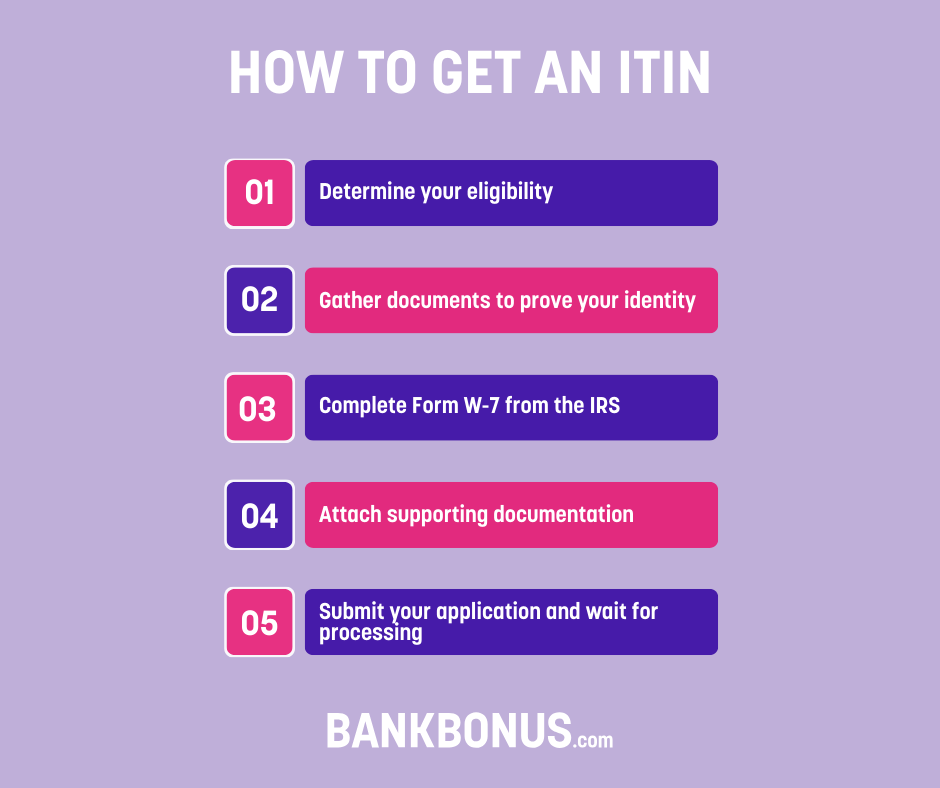
Here are the steps to apply for an ITIN:
- Determine your eligibility: To apply for an ITIN, you must be a non-citizen or resident alien who isn’t eligible for a Social Security Number (SSN) but earns taxable income in the US.
- Gather required documents: Obtain Form W-7 from the Internal Revenue Service (IRS) and collect necessary supporting documents to prove your identity and foreign status. Examples include a valid passport, birth certificate, or national identification card.
- Complete Form W-7: Fill out Form W-7 accurately and legibly, providing all the necessary information. Make sure to include your full legal name, mailing address, and foreign address (if applicable). Indicate the reason for applying for an ITIN and provide relevant details.
- Attach supporting documentation: Attach copies of the required supporting documents to your completed Form W-7. Make sure all documents are clear and readable, and that they support your identity and foreign status.
- Submit your application: You can mail your completed Form W-7 and supporting documents to the address provided on the form or schedule an appointment at an IRS Taxpayer Assistance Center to submit your application in person.
After submitting your application, you’ll need to wait for the IRS to process it. The IRS notes that you should usually hear back within seven weeks.
If you’re approved, you’ll receive your ITIN in the mail. Keep your ITIN in a secure place, since you’ll need it for various tax-related purposes and may need it to open a bank account.
6 Banks That Don’t Require an SSN
We’ve compiled a list of popular banks that don’t require social security numbers for you to open an account.
1. Citi
Citibank is one of the largest banks in the US, offering a full range of financial products to enhance your personal finances.
You can apply for any of Citi’s checking and savings accounts, CDs, banking IRAs, and small business bank accounts with an ITIN and a verification of your residential address.
Citi is known for offering nearly year-round welcome bonuses for opening a new account.
What’s special about Citi offers, however, is that these bonuses are tiered, starting with low requirements that are easy to meet and then increasing from there – up to thousands of dollars.
Learn More:
2. PNC
PNC is a popular bank with more than 2,600 branches and a user-friendly online banking platform.
While non-US citizens can’t apply for PNC accounts online without a government-issued ID, they can apply in person for all of PNC’s checking and savings products with alternative documentation.
For example, international students can apply with a valid passport and a second form of ID, and resident aliens can apply for a Virtual Wallet account with an ITIN at a local branch. PNC also specifies that you can apply for a small business account in person without an SSN.
PNC’s Virtual Wallet accounts come with no monthly fees, no opening deposit minimums, and no minimum balance requirements. You can also get as much as $400 when you open this type of account and set up direct deposits.
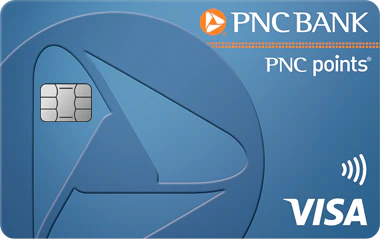
Learn More:
3. Wells Fargo
Like many of the banks on this list, Wells Fargo offers a range of FDIC-insured accounts, financial products, and services, including checking accounts and savings accounts.
Wells Fargo specifies that you can apply for its checking and savings accounts, personal loans, and some credit cards with an ITIN. Unlike PNC, you can easily open most accounts online with an ITIN, making the process smoother.
Wells Fargo also notes that:
Non-U.S. citizens without a U.S. issued taxpayer identification number must provide a government-issued ID that provides evidence of nationality or residence.Wells Fargo
Learn More:
4. Chase
Chase is another of the best banks for applicants who don’t have an SSN. Depending on your situation, you might not need an SSN to open a new Chase account. It depends on whether you have a green card or a visa.
All Chase applicants need to submit two forms of ID to open an account, for both business accounts and personal checking and savings accounts.
If you’re a non-U.S. permanent resident without a green card, you can apply for any of Chase’s checking and savings accounts with a Matricular Consular Card, passport with photo, or a US Employment Authorization Card with a photo, plus a secondary form of ID such as a utility bill or paystub with proof of address.
Learn More:
5. Bank of America 
As long as you’re living in the US, you can open a Bank of America account, but you’ll have to apply in person if you’re a non-resident alien.
Bank of America notes that you’re eligible for an account if you’re planning to open an Advantage SafeBalance Banking Account, you’re not a U.S. citizen, you have a U.S. residential address, or you aren’t a permanent U.S. resident.
Bank of America only requires you to present an ITIN if you have one. If not, you can apply by providing the address in your home country, proof of a US address, a primary ID such as a passport or Visa, or a secondary ID such as a driver’s license or work ID.
Bank of America has several account options. While the bank has some maintenance fees, there are several ways to avoid these checking account fees.
Learn More:
6. Alliant Credit Union 
Alliant Credit Union is one of the best credit unions and offers a few membership options, including becoming a member of their partner charity, Foster Care to Success (FC2S).
To become a member of this credit union, you need to be 18 years of age, have a valid ID issued by the US government, and have either an SSN or ITIN.
Once you’re approved as a member, you’ll be able to apply for several checking, savings, and CD accounts. Just be aware that the credit union will pull a soft credit check to review your credit history, which won’t impact your credit score.
Learn More:
Frequently Asked Questions
Why do banks require SSNs?
Banks often require SSNs as a form of identification. Even so, there is no legal requirement to have an SSN to open a bank account.
You should also remember credit unions and online banks as an alternative to traditional banks. They may have different requirements for opening an account and can be easy to open without visiting a branch.
Are there banks that don’t require Social Security Numbers?
Several banks don’t require SSNs to open a bank account. Some of these include Chase, Wells Fargo, and Bank of America. In most cases, these banks will require an ITIN to open an account instead.
Can undocumented immigrants get a bank account?
Undocumented immigrants can open a bank account in the US. Many banks allow you to open an account after you complete Form W-7 with the IRS and apply for an ITIN (Individual Tax Identification Number. In some cases, you may be required to apply in person at a local branch.
How much does it cost to open a bank account without an SSN?
Several of the best banks offer fee-free checking and savings accounts without requiring an SSN, and others allow you to waive account fees by meeting minimum deposit or balance requirements.
Do I need a SIN number to open a bank account?
No, a SIN number, or SIN, is not required to open a bank account. Instead, most banks in the US will ask for your SSN or ITIN, along with details such as your name, date of birth, and address to verify your identity.
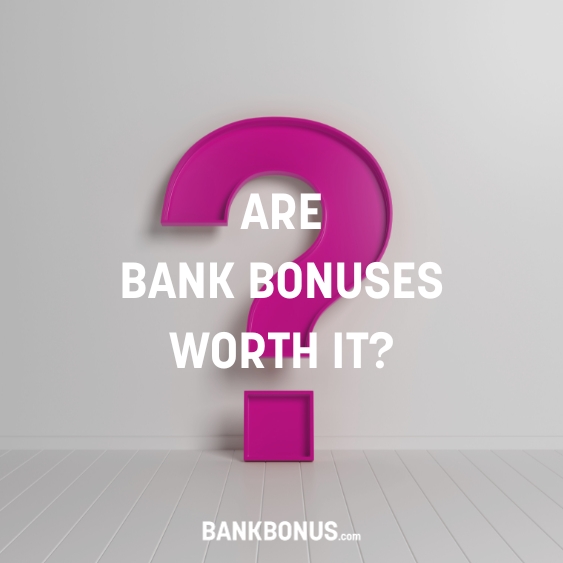

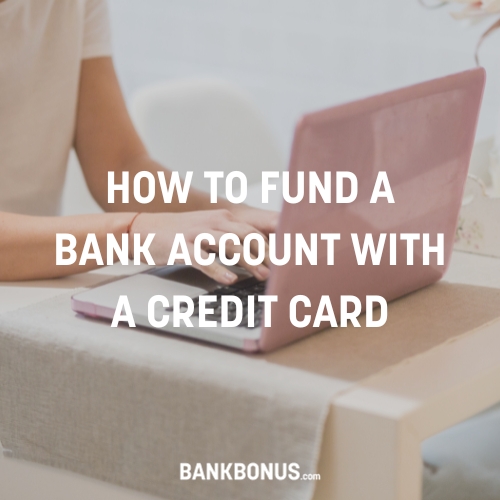

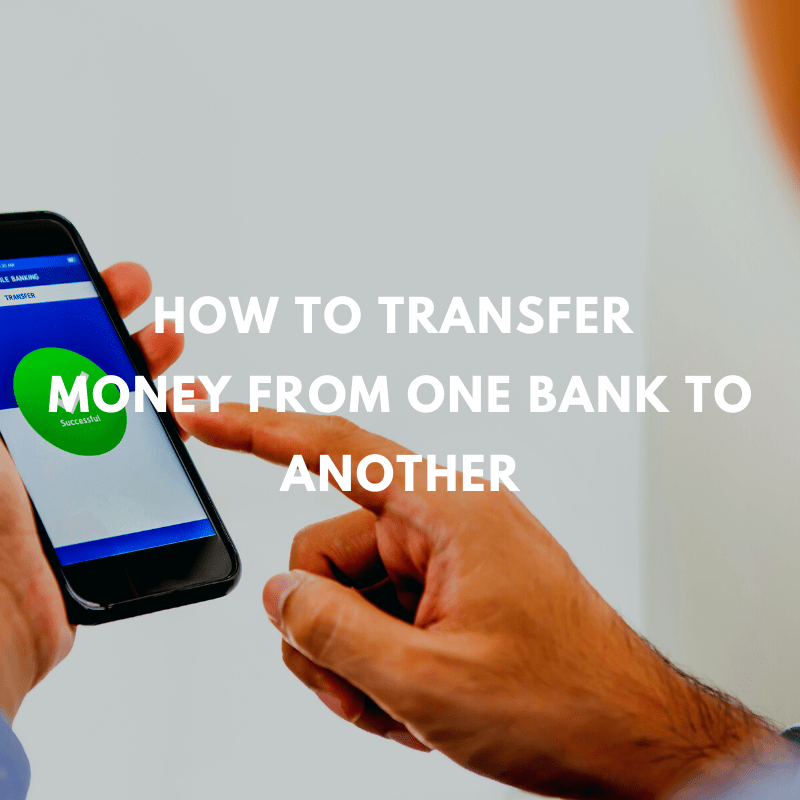
No comments yet. Add your own